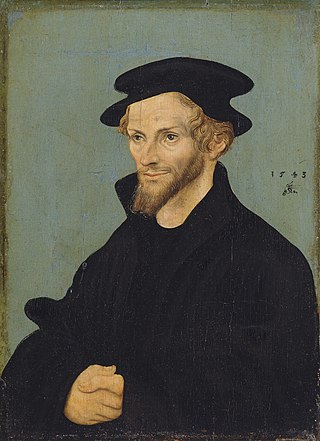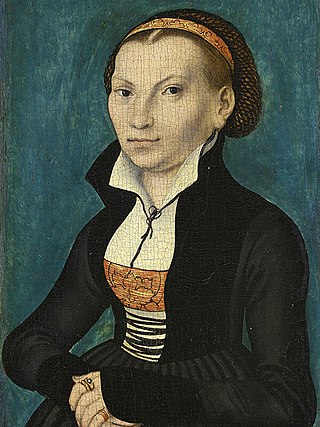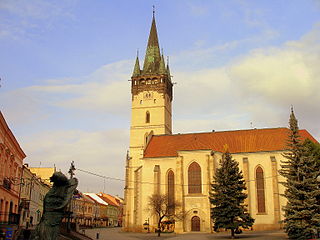Related Research Articles

Desiderius Erasmus Roterodamus was a Dutch philosopher and Catholic theologian who is considered one of the greatest scholars of the northern Renaissance. As a Catholic priest, he was an important figure in classical scholarship who wrote in a pure Latin style. Among humanists he was given the sobriquet "Prince of the Humanists", and has been called "the crowning glory of the Christian humanists". Using humanist techniques for working on texts, he prepared important new Latin and Greek editions of the New Testament, which raised questions that would be influential in the Protestant Reformation and Catholic Counter-Reformation. He also wrote On Free Will,In Praise of Folly, Handbook of a Christian Knight, On Civility in Children, Copia: Foundations of the Abundant Style and many other works.

The Reformation was a major movement within Western Christianity in 16th-century Europe that posed a religious and political challenge to the Catholic Church and in particular to papal authority, arising from what were perceived to be errors, abuses, and discrepancies by the Catholic Church. The Reformation was the start of Protestantism and the split of the Western Church into Protestantism and what is now the Roman Catholic Church. It is also considered to be one of the events that signified the end of the Middle Ages and the beginning of the early modern period in Europe.

Philip Melanchthon was a German Lutheran reformer, collaborator with Martin Luther, the first systematic theologian of the Protestant Reformation, intellectual leader of the Lutheran Reformation, and an influential designer of educational systems. He stands next to Luther and John Calvin as a reformer, theologian, and shaper of Protestantism.
Justificatio sola fide, meaning justification by faith alone, is a soteriological doctrine in Christian theology commonly held to distinguish the Lutheran and Reformed traditions of Protestantism, among others, from the Catholic, Eastern Orthodox, Oriental Orthodox and Assyrian churches. The doctrine asserts that it is on the basis of faith that believers are made right of their transgressions of the law of God rather than on the basis of what Paul calls "works of the law", sometimes called good works. This forgiveness is known as "justification". In classical Lutheran and Reformed theologies, works are seen to be evidence of faith, but the works themselves do not determine salvation. In contrast, Methodist doctrine affirms a belief in justification by faith that offers God's forgiveness, but holds that holy living with the goal of Christian perfection (sanctification) is essential for salvation.

The Ninety-five Theses or Disputation on the Power and Efficacy of Indulgences was a list of propositions for an academic disputation written in 1517 by Martin Luther, then a professor of moral theology at the University of Wittenberg which was controlled by the Electorate of Saxony. At the time, he was considered the youngest member of the theological faculty at the university which was still known for its medieval theology. Luther would later be promoted to take over the chair of Biblical studies of the theological staff of Wittenberg as the successor of Johann von Staupitz. Retrospectively considered to signal the start of the Protestant Reformation and the birth of Protestantism, the document advances Luther's positions against what he saw as the abuse of the practice of clergy selling plenary indulgences, which were certificates supposed to reduce the temporal punishment in purgatory for sins committed by the purchasers or their loved ones.

Thomas Müntzer was a German preacher and theologian of the early Reformation whose opposition to both Martin Luther and the Roman Catholic Church led to his open defiance of late-feudal authority in central Germany. Müntzer was foremost amongst those reformers who took issue with Luther's compromises with feudal authority. He was a leader of the German peasant and plebeian uprising of 1525 commonly known as the German Peasants' War.

Frederick III, also known as Frederick the Wise, was Elector of Saxony from 1486 to 1525, who is mostly remembered for the worldly protection of his subject Martin Luther.

Reformation Day is a Protestant Christian religious holiday celebrated on 31 October, alongside All Hallows' Eve (Halloween) during the triduum of Allhallowtide, in remembrance of the onset of the Reformation.

In Christian theology, justification is the event or process by which sinners are made or declared to be righteous in the sight of God.

Katharina von Bora, after her wedding Katharina Luther, also referred to as "die Lutherin", was the wife of Martin Luther, German reformer and a seminal figure of the Protestant Reformation. Beyond what is found in the writings of Luther and some of his contemporaries, little is known about her. Despite this, Katharina is often considered an important participant of the Reformation because of her role in helping to set precedents for Protestant family life and clergy marriages.
Protestantism originated from the Protestant Reformation of the 16th century. The term Protestant comes from the Protestation at Speyer in 1529, where the nobility protested against enforcement of the Edict of Worms which subjected advocates of Lutheranism to forfeit of all their property. However, the theological underpinnings go back much further, as Protestant theologians of the time cited both Church Fathers and the Apostles to justify their choices and formulations. The earliest origin of Protestantism is controversial; with some Protestants today claiming origin back to people in the early church deemed heretical such as Jovinian and Vigilantius.

Lutheranism as a religious movement originated in the early 16th century Holy Roman Empire as an attempt to reform the Roman Catholic Church. The movement originated with the call for a public debate regarding several issues within the Catholic Church by Martin Luther, then a professor of Bible at the young University of Wittenberg. Lutheranism soon became a wider religious and political movement within the Holy Roman Empire owing to support from key electors and the widespread adoption of the printing press. This movement soon spread throughout northern Europe and became the driving force behind the wider Protestant Reformation. Today, Lutheranism has spread from Europe to all six populated continents.

Martin Luther was a German priest, theologian, author, hymnwriter, professor, and Augustinian friar. He was the seminal figure of the Protestant Reformation, and his theological beliefs form the basis of Lutheranism.
Theologia Germanica, also known as Theologia Deutsch or Teutsch, or as Der Franckforter, is a mystical treatise believed to have been written in the later 14th century by an anonymous author. According to the introduction of the Theologia the author was a priest and a member of the Teutonic Order living in Frankfurt, Germany.

Propaganda during the Reformation, helped by the spread of the printing press throughout Europe and in particular within Germany, caused new ideas, thoughts, and doctrines to be made available to the public in ways that had never been seen before the sixteenth century. The printing press was invented in approximately 1450 by Johan Gutenberg, and quickly spread to other major cities around Europe; by the time the Reformation was underway in 1517 there were printing centers in over 200 of the major European cities.

In 16th-century Christianity, Protestantism came to the forefront and marked a significant change in the Christian world.

Protestantism is a branch of Christianity that follows the theological tenets of the Protestant Reformation, a movement that began seeking to reform the Catholic Church from within in the 16th century against perceived errors, abuses, and discrepancies.

The papacy underwent important changes from 1517 to 1585 during the Protestant Reformation and Counter-Reformation.

In Reformed theology, baptism is a sacrament signifying the baptized person's union with Christ, or becoming part of Christ and being treated as if they had done everything Christ had. Sacraments, along with preaching of God's word, are means of grace through which God offers Christ to his elect. Sacraments are believed to have their effect through the Holy Spirit, but these effects are only believed to accrue to those who have been predestined to have faith in Christ.

Proto-Protestantism, also called pre-Protestantism, refers to individuals and movements that propagated ideas similar to Protestantism before 1517, which historians usually regard as the starting year for the Reformation era. The relationship between medieval sects and Protestantism is an issue that has been debated by historians.
References
- ↑ Luther: The Life and Legacy of the German Reformer Retrieved 5 June 2017